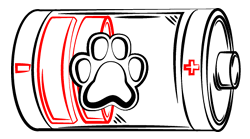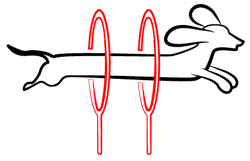
Paws ‘N’ Pups Quickview
Size
| Energy Level
| Trainability
| Paws ‘N’ Pups Rank
|
Characteristics
| Physical Characteristics: Height: 25-29” Weight: 100-150 lbs. Energy Level: Low | Colors: The Pit Bull Mastiff Mix is found in the following colors:
|
Health & Longevity
Average Life Span: 8-12 years
Like all hybrid breeds, the American Pit Bull Terrier Mastiff mix is less susceptible to hereditary health issues than his purebred counterparts, but he may still experience health problems common to either parent breed.
Some Pit Bull Mastiff mixes may experience hip dysplasia, a degenerative condition that results from a malformed hip joint not allowing the thighbone to fit properly into place. Hip dysplasia can lead to discomfort, pain, limping, and, in more severe cases, arthritis or even lameness. Surgery may be required in such cases. Although it is hereditary, hip dysplasia can be triggered by rapid weight gain and injury, such as falling on a slippery floor or landing incorrectly after jumping.
This hybrid breed may also be impacted by hypothyroidism, a thyroid condition that occurs when the thyroid gland cannot produce sufficient amounts of hormone. Hypothyroidism leads to issues including obesity, lethargy, infertility, and hair loss. The condition can be treated, but the affected dog will be required to take daily medication for the duration of his life.
Gastric torsion, more commonly referred to as bloat, is a possibility for the Pit Bull Mastiff mix. Bloat occurs most often in large breeds, and it is caused by the stomach filling with gas, fluid, or food, expanding dangerously and putting excess pressure on other organs. In some cases, the stomach flips, trapping blood in the stomach and blocking it from traveling to the heart and other vital areas. Bloat can be fatal, so take your dog to the veterinarian right away if you notice symptoms such as pale gums, lethargy, excessive drooling, failed attempts to vomit, or a swollen stomach.
Other potential health problems for the Pit Bull Mastiff mix include kidney problems, eye issues, heart disease, cancer, epilepsy, and overheating.
The average lifespan for a Pit Bull Mastiff mix is 8-12 years, standard for a giant breed.
Temperament & Train-ability
The Pit Bull Mastiff mix can be a strong and dominant dog who needs strong leadership. If properly trained, he can be a loyal, loving, and obedient family companion. He is a confident dog who will stop at nothing to protect his family.
The Pit Bull Mastiff loves having room to roam and should not live in an apartment, where he will likely become depressed. On average, the Pit Bull Mastiff needs at two daily jogs, runs, or long, brisk walks. He also needs plenty of time to play games such as fetch outdoors. This breed also needs adequate mental stimulation, which can be provided through training, challenging games, or puzzle toys. Appropriate amounts of physical and mental stimulation can keep your Pit Bull Mastiff happy and well-behaved.
Another requirement for the Pit Bull Mastiff is plenty of companionship and attention. He forms a very strong bond with his owner and does not like to be separated from him for long periods of time. If the Pit Bull Mastiff is left alone too long, he is likely to become anxious, depressed, and potentially destructive.
A home with young children is not the ideal place for the Pit Bull Mastiff. He needs proper training and socialization to behave appropriately with children, and even then he is large and prone to accidentally knocking over or injuring small children while playing. He is likely to view cats and other small animals as prey, pursuing them and probably attempting to eat them. He may be dog-aggressive as well, especially with dogs of the same sex. Extensive socialization is a must for this breed. Expose the Pit Bull Mastiff early and often to a wide variety of people, places, pet, sights, smells, and sounds. If you want your Pit Bull Mastiff to live in a home with other pets, it is best that he is raised with them.
With strangers, the Pit Bull Mastiff is not particularly welcoming, as he is territorial and protective. This does make him an excellent guard dog, the task for which he was specifically bred. Interestingly, although he is one of the best possible guard dogs available, the Pit Bull Mastiff is not a great watch dog, merely because he does not like to bark often.
Training the Pit Bull Mastiff will not be an easy task, as he is a very strong-willed, confident dog. You must establish yourself as a strong leader by firmly, consistently enforcing your rules and expectations. Do not let the Pit Bull Mastiff decide that you have a weak personality, or he will assert his dominance and refuse to obey you. This is not the dog for a first-time owner or for someone who feels timid about trying to train a strong breed. If you choose to purchase a Pit Bull Mastiff, it is recommended that you have experience with other dominant breeds and that you are capable of being the firm leader he needs.
Grooming
Generally, the Pit Bull Mastiff has a short coat that sheds moderately. Brushing 1-2 times weekly should be sufficient to minimize loose hairs and keep his coat shiny. However, he does experience heavier seasonal sheds, at which point you will probably want to brush him daily.
Bathing your Pit Bull Mastiff too frequently can lead to dry skin, and bathing such a gigantic dog is not an easy task, so bathe him only when necessary. Trim his nails when they are long enough to touch the floor, and check his ears weekly for signs of infection such as redness, tenderness, and odor. Brush his teeth at least 2-3 times weekly to maintain overall health and prevent bad breath.
Diet
On average, the Pit Bull Mastiff should consume 4.5-6 cups of high quality dry dog food daily, preferably divided into at least two smaller meals.
Take precautions against bloat by ensuring your Pit Bull Mastiff does not eat too rapidly, preventing him from drinking excessive amounts of water right before or right after meals, and imposing a one-hour wait time between meals and exercise. Do not let him drink from a raised food bowl unless your veterinarian specifies otherwise.
Ensure that your Pit Bull Mastiff has access to clean, fresh drinking water at all times.
Looking for a Pit Bull Mastiff Mix?
 Find A Pit Bull Mastiff Mix Breeder |  Pit Bull Mastiff Mix Puppies For Sale |  Adopt A Pit Bull Mastiff Mix |
Cost
The cost of a Pit Bull Mastiff puppy varies widely, with reported costs ranging from $350-$2,000. Prices vary according to factors such as breeder location and reputation, gender, and lineage.
If you adopt a Pit Bull Mastiff, expect to pay up to $200 in adoption fees, depending on your location.
Paws ‘N’ Pups Ranking
Paws ‘N’ Pups ranks every breed out of 4 with 1 being easiest to integrate into your life and 4 being the toughest – The lower the ranking the better.
Ranking takes into account a few basic factors including cost, skill level needed, high vs low maintenance and how critical regular training is to success. The Pit Bull Mastiff ranks a 3.5. He is an excellent guard dog who can be a loving family companion if properly trained, and he does not bark often. However, he requires an owner with a strong personality, as well as extensive socialization and training, plenty of physical and mental stimulation, and as much companionship as possible. He is not likely to get along with other pets, dogs, or strangers, and he is not recommended for homes with small children.
Breeds Similar To Pit Bull Mastiff Mix
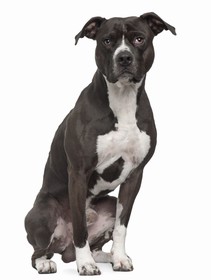 American Pit Bull Terrier | 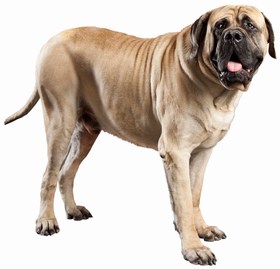 Mastiff | 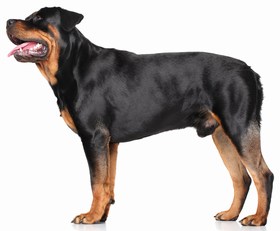 Rottweiler | 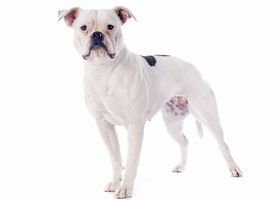 American Bulldog |


